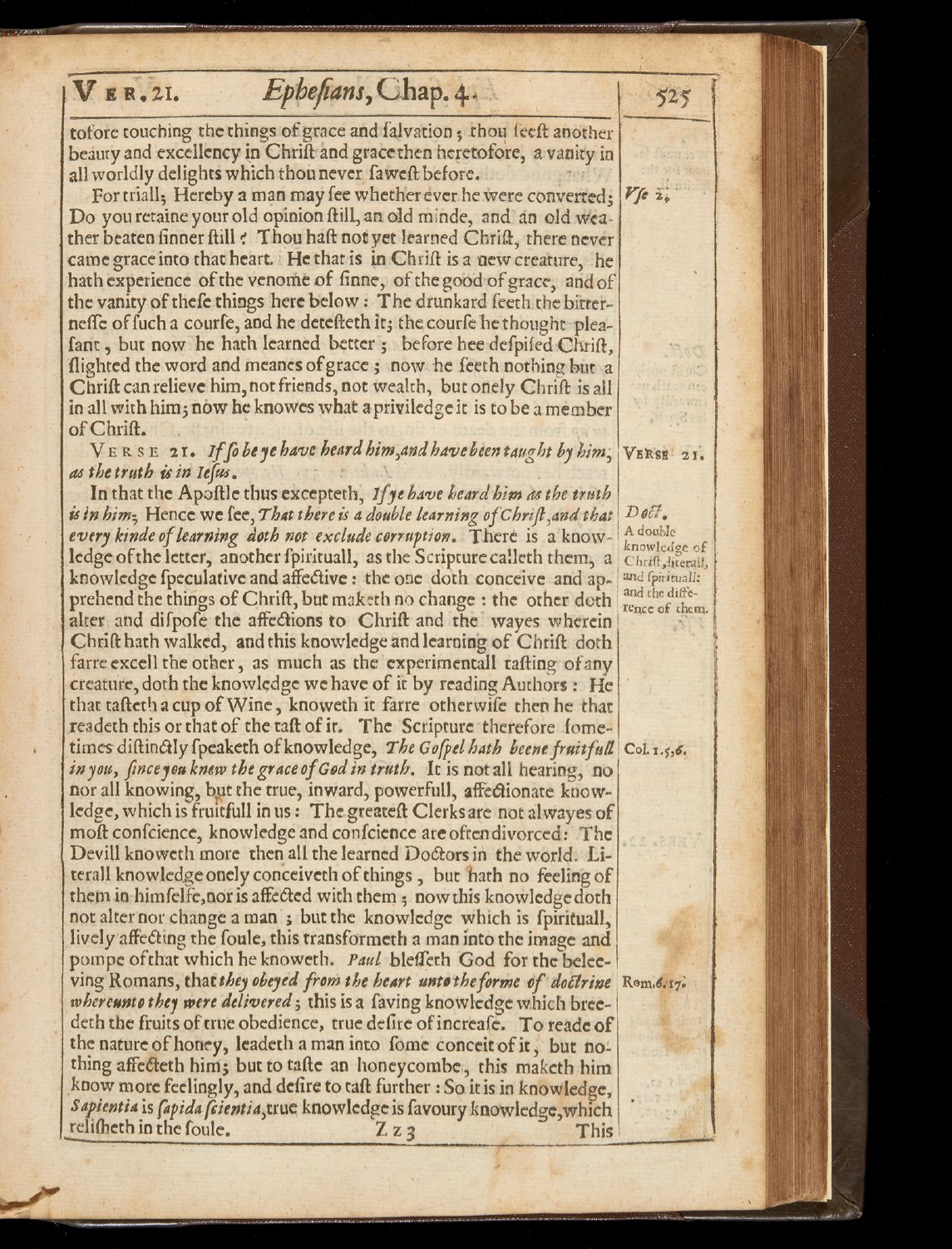

VT
s
Epbe fians,
Chap. 4.
525
tofore touching the things
of
grace
and
falvation
;
thou
feeft
another
beauty
and
excellency
in
Chrift
and grace
then heretofore,
a vanity
in
all
worldly delights which thou never faweft before.
For triall; Hereby
a man
may
fee
whether
ever he
were converted;
Yfe
i
Do
you retaine
your old opinion
]till,
an old m;nde,
and
an
old
wea-
ther
beaten
(inner
fill?
Thou
haft
not yet
learned
Chritt,
there
never
came graceinto
that
heart. He
that
is
in
Ch
rift
is
a
new creature,
he
hath
experience
of
the venome
of
fine,
of
the good
of
grace,
and
of
the vanity
of
thefe things here
below
:
The
drunkard feeth the bitter-
neffe
of
fuch
a
courfe,
and he
detefeth
it; the
courfe he
thought
plea
-
fant
,
but now
he
bath
learned
better
;
before bee
defpifed
Chrift,
flighted
the word
and meanes
of
grace
;
now
he
feeth nothing but
a
Chrift
can relieve
him, not
friends,
not wealth, but
onely
Ch
rift
is
all
in all
with him;
now
he knowes what a priviledgeit
is
to be
a
member
of
Chrift.
VERSE
a
t.
I
f
fo
be
ye
have heard him,and have
been
taught
by
him; Vsnsa
21.
as
the
truth
is
in
lefus.
In that the
Apofle
thus excepteth, ifye
have heard him as
the
truth
is
in him; Hence we
fee,
That
there
is
a double
learning
ofChrifi,and that
Doc
?.
every kinde
oflearning
doth not exclude corruption.
There
is a
know-
ndowt6doe
f
ledge
ofthe
letter
,
another
fpirituall,
as
the Scripture calleth
them,
a
chdr;,terai:,
knowledge fpeculativeand
affective
:
the
one
doth
conceive
and ap-
prehend the things
of
Chrift,
but
maketh
no
change
:
the other doth
Ì
e
of
lem.
alter
and
difpofe
the
affecìions
to
Chrift
and
the
wayes wherein
Chrift
bath walked,
and this
knowledge and learning
of
Chrift
loth
farreexcell the other
,
as
much
as
the experimentall
tailing
ofany
creature, doth the knowledge we have
of
it
by reading Authors
:
He
that
tafeth
a
cup
ofWine,
knoweth
it
farre
otherwife then he that
readeth
this
or that
of
the tail of
ir.
The
Scripture therefore fome-
times
diftindìly fpeaketh
of
knowledge,
The
Gofpel
bath
beene
fruit/id
Cot
1.5,e,
in
you, fince
you knew
thegrace
of
God
in
truth.
It
is
not
all
hearing, no
nor
all
knowing,
but the
true, inward, powerfull,
affec4ionate
know-
ledge, which
is
frwtfull
in us
:
The
greateft Clerks
are
not alwayes
of
moil
confcience, knowledge and confcience are often divorced:
The
Devitt knoweth
more then all
the
learned
Doltors
in
the world. Li-
terall
knowledgeonely conceiveth
of
things
,
but hath
no feeling
of
them
in
himfelfe,nor
is
affected
with them
;
now
this
knowledge
doth
not
alter nor change
a
man ;
but the knowledge which
is
fpirituall,
lively
affecìing
the
foule, this
transformeth
a
man into
the
image and
pompe
of
that which
he
knoweth.
Paul
bleffeth
God for the
helee-
ving
Romans,
that
they obeyed
from the heart
unto
theforme
of
doilrine
Rom.srt9:
whereunto
they were
delivered;
this
is a
faving
knowledge which bree-
deth the
fruits
of
trueobedience, true delire
of
increafe.
To
reade
of
the nature
of
honey, leadeth
a
man into fome
conceit
of
it,
but no-
thing affecìeth
him;
but to
tafle an
honeycombe,
this maketh
him
know
more feelingly,
and delire
to
raft
further
:
So it
is
in
knowledge,
sapientia
is
pipida
feientia,true knowledge
is
favoury
knowlcdge,which
relifheth
in
the
foule.
Z
z
3
This

















